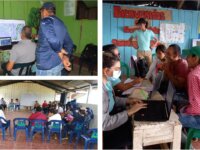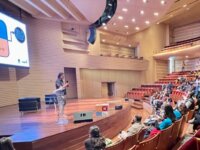Administrative burden is red tape - mandatory processes that continue to exist that have nothing to do with an internal policy's intention. It is experienced not only by citizens trying to access a service, but also public servants trying to deliver it. The Government of Canada is looking at streamlining its administrative policies relating to Service and Digital by applying an administrative burden lens to it.
Innovation Tag Opengov: enablers
The Electronic Family Wallet (Bolsillo Familiar Electrónico) is an innovation in technological services from Chile. It is an electronic payment system facilitates the delivery and use of the monthly monetary contribution that more than 1.4 million people will receive from May 2023, for exclusive use in purchases in food businesses.
The DYPA Career Days, organized by the Public Employment Service (DYPA) in Greece, fosters direct engagement between the business sector and jobseekers. This marks a significant departure for DYPA as these events are now systematically conducted, spanning the entire country. A key strength of DYPA’s Career Days lies in their comprehensive promotion of employment opportunities and the strategic engagement of interested individuals through a process characterized by simultaneous, adaptable, and…
CGR has a great amount of available data that need to be exploited to improve its work, while deepening the digital transformation of the State to improve its quality.
The aim is to enhance data analysis through the use of algorithms to anticipate risks in the fight against corruption, as well as to improve the channels for citizen complaints.
We apply the use of data and technologies in our daily work, thus impacting the State.
The innovation is developed due to the need to integrate the process of financial reporting of projects with the acceleration program of Start-Up Chile, benefiting the entrepreneurs of the program and the Chilean Government itself. The process seeks to educate on the relevance of project financial planning, while preparing them to perform efficient and high standard financial reporting to the Chilean government.
Blockchain is transforming the world and we created the first pilot to experiment with this technology, promoting this transformation in the Colombian State entities making it more efficient, transparent and agile. We seek to accompany and promote projects that generate better services and processes within the entities; learning and documenting the entire process.
The Ministry of Education of Guanajuato seeks to address the notably high school drop out rates with the help of Big Data and Artificial Intelligence. Student trajectories are identified to create strategies and public policies to increase attainment and the educational level of the population. These efforts lay the groundwork to generate an Early Warning System to identify students at risk of dropping out of school.
Digitalization is key to the present and future of local commerce in any city. For digitalization to be effective, it must be personalized, thinking about the uniqueness of commerce, connected with the local and with the world to achieve greater competitiveness. Like the "Sherpas" in the mountains, the "Digital Sherpas" in Las Rozas guide businesses in digitalization and the multichannel and gamified platform "Las Rozas Fans" helps them connect to the world in an attractive and easy way for…
Several land areas in Colombia lack of formal registry and documents as a consequence of the absence of territorial information and the aftermath effects of the armed conflict. Through the intensive use of new technologies and innovative methodologies, the problem of characterization of vacant areas was addressed by using novel methods to consolidate land data and information, benefiting the farmers of the area.
Public innovation Labs have been at the forefront of the transformation of public innovation ecosystems in different countries and cities. However, they are knowingly sensitive to changes in public administrations and to political decisions. Our Spider strategy (Araña) seeks to strengthen and give sustainability over time to public innovation based on the creation of networks and ecosystems and the non-exclusive dependence on innovation units or Labs, thus diminishing the related aforesaid…






